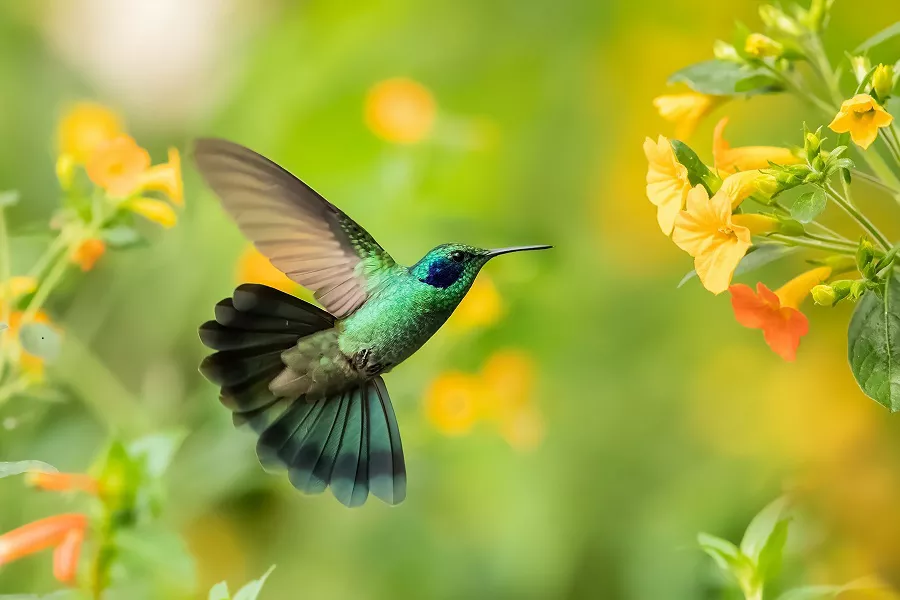Hummingbirds are not only enchanting to watch but also play a vital role in maintaining ecological balance. Gardeners and nature enthusiasts often wonder if these tiny birds can help control mosquito populations due to their insectivorous nature. In this article, we will delve into the intriguing question of whether hummingbirds eat mosquitoes and explore their potential as natural mosquito predators.
Hummingbird Diet: Nectar, Insects, and More:
Hummingbirds are primarily known for their love of nectar-rich flowers, which provide them with the necessary fuel for their high-energy activities. However, they are also opportunistic insect hunters and supplement their diet with small insects, spiders, and other arthropods. This insectivorous behavior raises the question of whether mosquitoes are part of their prey.
Do Hummingbirds Eat Mosquitoes?
Yes, hummingbirds do eat mosquitoes. In fact, they will eat just about any type of insect, including flies, beetles, and moths. Hummingbirds are particularly attracted to mosquitoes because of the high protein content in their bodies.
A single mosquito can provide a hummingbird with a significant amount of energy.
How Do Hummingbirds Catch Mosquitoes?
Hummingbirds are agile fliers capable of hovering, flying backward, and changing direction quickly. When a mosquito or other small insect enters their territory, hummingbirds may chase after it. They use their exceptional maneuverability to dart and twist through the air, attempting to catch the insect with their beak.
To catch mosquitoes specifically, hummingbirds employ a technique called “hawking.” They hover in one spot, vigilantly observing their surroundings. When they detect the movements of a mosquito, they swiftly lunge toward it, extending their long, slender beaks to snatch the insect out of the air.
The hummingbird’s beak is adapted for precision feeding and catching small prey. It has a sharp, narrow shape that allows for accurate targeting of tiny insects like mosquitoes. Once the hummingbird captures its prey, it typically consumes it immediately or takes it back to its perch for consumption.
It’s worth noting that while hummingbirds may eat mosquitoes, they are not significant contributors to controlling mosquito populations. Their consumption of mosquitoes is incidental rather than an effective means of mosquito control. Mosquitoes make up only a small portion of a hummingbird’s diet, with the majority consisting of nectar and other small insects.
Do hummingbirds eat other insects?
Yes, hummingbirds do eat insects. While nectar is their primary source of food, hummingbirds are also opportunistic and will consume small insects as a supplementary part of their diet. Insects provide additional protein and nutrients that are essential for their survival. Hummingbirds have been observed catching and consuming small flying insects like gnats, fruit flies, mosquitoes, and spiders. They are known to hover near flowers or in mid-air to catch these insects with their long, specialized beaks and agile flight capabilities.
The inclusion of insects in the hummingbird’s diet is particularly important during the breeding season when the demand for protein increases. Insects provide the necessary nutrients for the development of eggs and the growth of young hummingbirds.
It’s worth noting that while hummingbirds do consume other insects, their primary focus remains on nectar from flowers. Nectar is their main energy source, and they will visit a wide variety of flowers to extract the sweet nectar using their specialized beaks and tongues.
What Do Hummingbirds Like To Eat?
Hummingbirds have a specialized diet that primarily consists of nectar from flowers. They are attracted to flowers that produce high-quality nectar, which is rich in sugars and provides the energy they need for their rapid wing movements. Nectar serves as the main source of fuel for hummingbirds.
In addition to nectar, hummingbirds also consume small insects, spiders, and other arthropods. These insects provide essential proteins and nutrients that are necessary for their growth, development, and reproductive processes. Insects serve as a dietary supplement and are particularly important during the breeding season when the demand for protein increases.
To attract hummingbirds to your garden or feeding station, it’s important to offer them suitable food sources. Here are some key types of food that hummingbirds enjoy:
Nectar from Flowers: Hummingbirds are attracted to brightly colored, tubular-shaped flowers. Some popular nectar-rich flowers that hummingbirds favor include trumpet vine, bee balm, salvia, petunias, columbine, and fuchsia. Planting a variety of these flowers will help attract and sustain hummingbirds in your garden.
Hummingbird Feeders: Hummingbird feeders are artificial devices that mimic the shape and color of flowers, offering a readily available nectar substitute. Fill the feeders with a sugar-water solution, made by mixing four parts water with one part white granulated sugar. It’s essential to keep the feeders clean and the nectar fresh to ensure the health of visiting hummingbirds.
Insects: While nectar is their primary food source, hummingbirds actively hunt for small insects, including gnats, fruit flies, tiny beetles, and midges. Planting native plants that attract insects will help provide a natural source of insects for hummingbirds to feed on.
Spiders and Other Arthropods: Hummingbirds also consume spiders and other small arthropods that they encounter during their feeding flights. These arthropods contribute to the hummingbird’s overall nutritional intake.
It’s important to note that providing a diverse and natural food supply, including both nectar and insects, is essential for the overall health and well-being of hummingbirds. Creating a habitat with a variety of flowering plants, offering clean and fresh nectar in feeders, and minimizing pesticide use will attract and support these fascinating birds in your area.
Conclusion:
While hummingbirds do consume mosquitoes, these pesky insects are not a primary or significant part of their diet. Hummingbirds primarily focus on nectar-rich flowers and small flying insects that are more abundant and easier to catch. Nevertheless, attracting hummingbirds to your garden can contribute to a balanced ecosystem and provide natural pest control benefits. By creating a hummingbird-friendly habitat with nectar-rich flowers and water sources, you can enjoy the beauty of these remarkable birds while contributing to a healthier and more vibrant environment.


 Facebook
Facebook  Instagram
Instagram  Youtube
Youtube 